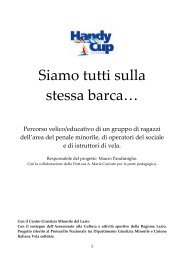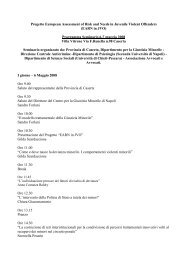Scarica il documento - Dipartimento per la Giustizia Minorile
Scarica il documento - Dipartimento per la Giustizia Minorile
Scarica il documento - Dipartimento per la Giustizia Minorile
Create successful ePaper yourself
Turn your PDF publications into a flip-book with our unique Google optimized e-Paper software.
motivational interviewing for juven<strong>il</strong>e<br />
(ex-) offenders<br />
di Robert Suvaal<br />
From 2001 to 2003 we have ex<strong>per</strong>imented in the Nether<strong>la</strong>nds in trying out the<br />
methodology of Motivational Interviewing as an instrument for our resettlement<br />
approaches of juven<strong>il</strong>e (ex-) offenders. The ex<strong>per</strong>iences in my country proved to be very<br />
positive.<br />
Due to this <strong>per</strong>ception I suppose it can be interesting for the field of Youth Justice in<br />
Italy to make the acquaintance with this methodology, the more so because recently<br />
there have already been two ex<strong>per</strong>iments with regard to MI aimed at Youth Justice in<br />
your country.<br />
What is Motivational Interviewing?<br />
Motivational interviewing (further in this article called Mi) is “a directive client-oriented<br />
style of counselling meant to achieve a change of behaviour by helping clients to<br />
explore and resolve their ambivalence. Compared with non-directive counselling it is more<br />
focused and goal-directed. the examination and resolution of ambivalence is its central<br />
purpose, and the counsellor is intentionally directive in pursuing this goal” (M<strong>il</strong>ler & rollnick).<br />
the purpose of Mi is by working together with the client to bring about a change of<br />
behaviour - a change to which the client is not inclined naturally. together with the client<br />
motivators are searched that can be helpful to achieve the desired change of behaviour. Mi<br />
originates from the usa where it was developed in the 80’s for the benefit of the care of<br />
addicts (mainly alcohol and drug addicts).<br />
the most important characteristics of Mi are avoiding coercion and applying pressure.<br />
instead Mi aims to look with the client for motivators towards the desired, alternative<br />
behaviour. in the meantime research has convincingly proven the effectiveness. other disciplines<br />
as well have started to make use of Mi, such as forensic psychiatry, prevention of<br />
Hiv/aids and youth care.<br />
the concept of Mi mainly consists of the starting points, the spirit, the principles and<br />
the basic or micro sk<strong>il</strong>ls.<br />
the starting points are:<br />
• Unconditional acceptance of the client.<br />
• Constructive confrontation.<br />
Speciale<br />
165





